ENEMIES OF INTELLIGENCE
OF INTELLIGENCE
Knowledge and Power in American National Security
RICHARD K. BETTS

Columbia University Press
New YorkColumbia University Press
Publishers Since 1893
New York Chichester, West Sussex
cup.columbia.edu
Copyright 2007 Columbia University Press
All rights reserved
E-ISBN 978-0-231-51113-1
Library of Congress Cataloging-in-Publication Data
Betts, Richard K., 1947
Enemies of intelligence : knowledge and power in American nationalal security /
Richard K. Betts.
p. cm.
Includes index.
ISBN 9780231138888 (cloth : alk. paper)
ISBN 9780231138895 (pbk : alk. paper)ISBN 9780231511131 (e-book)
1. Intelligence serviceUnited States. 2. National securityUnited States.
3. TerrorismUnited StatesPrevention. I. Title.
JK468.I6B44 2007
327.1273 dc22
2007003937
A Columbia University Press E-book.
CUP would be pleased to hear about your reading experience with this e-book at .
For a very motley crew that, over the years,
helped get me to this book:
Michael I. Handel
Samuel P. Huntington
Robert Jervis
John D. Steinbruner
War is not an exercise of the will directed at inanimate matter, as is the case with the mechanical arts, or at matter which is animate but passive and yielding, as is the case with the human mind and emotions in the fine arts. In war, the will is directed at an animate object that reacts.
CARL VON CLAUSEWITZ, ON WAR
Everyone with experience in decision making knows that the more closely we explore alternative courses of action, the more clearly we become aware of limitations of various kinds which restrict the courses open to us. Sometimes decision making proves to be no more than the painful process of discovering that there is only one thing to do or even nothing to be done. On the other hand, experience also recognizes situations in which the decision maker can in some degree impose a pattern on the future course of affairs, rather than merely responding to its demands. It may be inevitable that we should sometimes expect far more of our governors and even of ourselves than in fact is open to them or to us and suffer in consequence unnecessary agonies of fury or guilt; and should sometimes expect far too little and thus allow a high human function to be abdicated. Yet the extent of such errors might be reduced, if we understood the process better; and it is important that it should be reduced, for at the moment it imperils the whole working of our political system.
SIR GEOFFREY VICKERS, THE ART OF JUDGMENT
Just as the mistakes made in each warning failure are old ones, so are the proposals for doing something about it.
CYNTHIA M. GRABO, ANTICIPATING SURPRISE
CONTENTS
2 / Permanent Enemies:
Why Intelligence Failures Are Inevitable
4 / Incorruptibility or Influence?
Costs and Benefits of Politicization
5 / Two Faces of Failure: September 11 and
Iraqs Missing WMD
This book puts recent controversies about strategic intelligence into historical and conceptual context. I have toyed with the idea of a book on intelligence off and on since the 1970s. The catalyst for what appears here is the debate over intelligence reform that followed the one-two punch delivered by September 11, 2001, and the mistaken national intelligence estimate a year later concerning Iraqs weapons of mass destruction. The events of September 11 shocked laypeople (and even many professionals in defense policy who should have known better, had they been paying attention to the evolution of terrorism) into a new sense of insecurity. The intelligence estimate provided the justificationthough it was not the causefor the decision to launch an unnecessary and disastrous war.
As citizens and policymakers were shocked into recognizing the importance of intelligence in averting disasters, the natural reaction of many at first was impatience, or disgust, with the apparent incompetence of the American intelligence services that had allowed these catastrophic errors. Much of this reaction reflected the navet of those discovering familiar pathologies for the first time. After much controversy, political imperatives forced legislation for a major reorganization of the intelligence system that will take years to shake down. Debate continues, as politicians and bureaucrats grapple with the uncertain results of the reform initiatives.
This book is short, but its roots lie in three decades of thinking about intelligence failures and in participant observation on the periphery of the contemporary U.S. intelligence community. I had the good fortune in the 1970s to be in on the takeoff of the public examination of intelligence processes and I capitalized on that opportunity in my writing. Episodically ever since then and between projects on other subjects, I have combined regular academic research with what I learned from very limited, yet still highly enlightening experiences in the policy world. I was a staff member of the original Senate Intelligence Committee (the Church committee) and the National Security Council in the 1970s, a consultant to the National Intelligence Council and Central Intelligence Agency in the 1980s and in years since, a member of the military advisory and national security advisory panels of the director of central intelligence in the 1990s, and a member of the National Commission on Terrorism (the Bremer commission) in 19992000. The melding of policy analysis and theoretical work that I found rewarding from this interaction of research and brief participant observation is out of fashion in contemporary political science, but I continue to believe that separating study-based theory from experience-based policy analysis impoverishes both.
The taproot of the book was my first exposure, in 1975, to real knowledge of intelligence. As I was finishing my dissertation on the role of military advice in decisions to resort to force, the epochal first investigations of the intelligence community by Congress began under Senator Frank Church and Rep. Otis Pike. Originally spurred by a mission to investigate scandals, both committees expanded into more complete examinations of the work of intelligence agencies. Barry Carter, on the ground floor of the Church committee staff as it was gearing up, asked John Steinbruner, then at Harvard, if he knew of budding PhDs who might be recruited for the staff. Having just heard my seminar on my dissertation, John recommended me, and I joined the staffs military intelligence task force. Political conditions at the time, following Watergate and the Indochina debacle, led to unprecedented cooperation between the intelligence community and investigatorsto the degree that late in the process, President Gerald Ford fired William Colby, the director of central intelligence (DCI), for allowing so much to be revealed. I have never before or since learned so much in so short a time as I did during those months of 70-hour weeks interviewing intelligence professionals, examining highly classified documents on a wide range of issues, getting briefings on sensitive secret programs, and writing memos, studies, and sections of the committees final report.
Back then I intended to write a comprehensive book on the role of intelligence in foreign policy, not least because my experience on the Church committee had left the scholar in me frustrated. I could not help thinking that if only the committees hundreds of file cabinets of secret documents, reports, and interview transcripts could be used as an archive for publishable research, I could write a blockbuster. All but a small portion of the staffs work remained classified, however. The committees final report, published in seven hefty volumes (on top of six volumes of hearings), was only the tip of the iceberg.

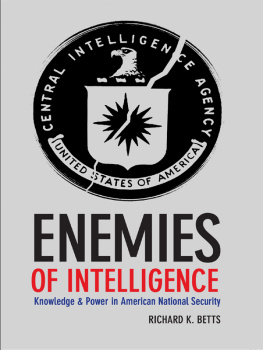
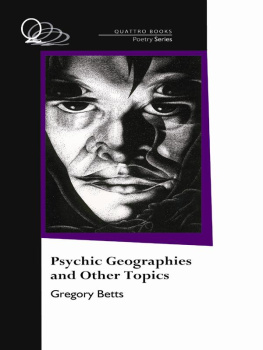


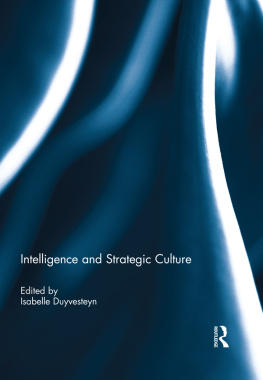
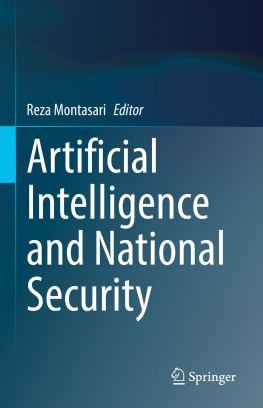
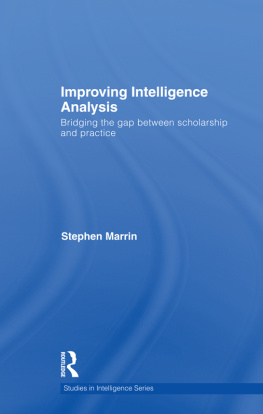
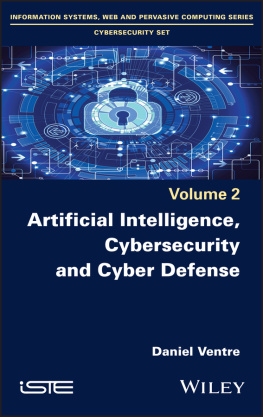
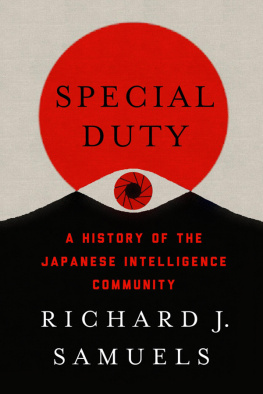
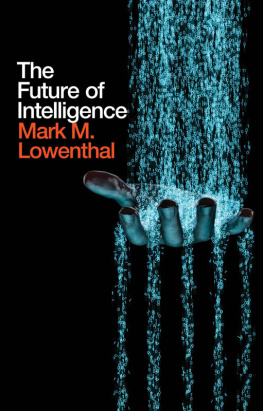
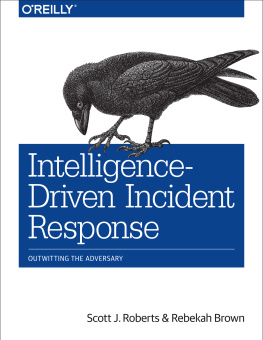
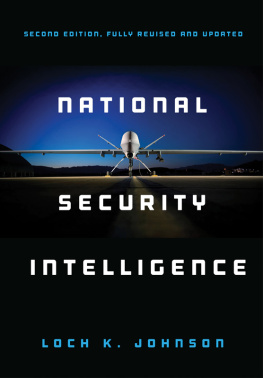
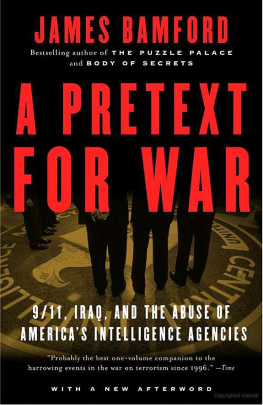

 Columbia University Press New York
Columbia University Press New York